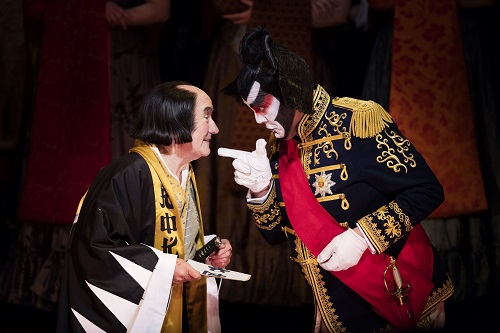 United Kingdom Gilbert and Sullivan, The Mikado: Soloists, Chorus and Orchestra of Scottish Opera / Derek Clark (conductor), Edinburgh Festival Theatre, 3.6.2016. (SRT)
United Kingdom Gilbert and Sullivan, The Mikado: Soloists, Chorus and Orchestra of Scottish Opera / Derek Clark (conductor), Edinburgh Festival Theatre, 3.6.2016. (SRT)

Cast:
The Mikado – Stephen Richardson
Nanki-Poo – Nicholas Sharratt
Ko-Ko – Richard Suart
Pooh-Bah – Andrew Shore
Yum-Yum – Rebecca Bottone
Katisha – Rebecca de Pont Davies
Pish-Tush – Ben McAteer
Production:
Derek Clark (conductor)
Martin Lloyd-Evans (director)
Dick Bird (designer)
Mark Jonathan (lighting designer)
Steve Elias (choreographer)
I inescapably find myself with a deeply conflicted attitude to Gilbert and Sullivan. I never look forward to a production of their work, but always in the theatre I find myself enjoying it more than I expected to, despite the inevitable longueurs, and so, true to form, I enjoyed this Mikado almost in spite of myself.
For a start, it’s the most visually appealing production of anything that I’ve seen from Scottish Opera in years. Dick Bird’s sets, a series of frames within frames, unfold gaily to reveal each new scene, and the bright primary colours are consistently jolly to look at. It also allows them to include lots of different tableaux, such as the Hokusai wave that first bears in Katisha, the battleship on which the Mikado arrives, or the vast figure of death that overshadows the penultimate scene. The costumes, too, are brightly coloured and, like the piece itself, merge whimsical Japonisme with quintessential Englishness. All of this sets up a framework that allows the story to unfold clearly and directly though, like all of Gilbert and Sullivan’s operettas, they would benefit from shaving twenty minutes off the spoken dialogue.
The cast all buy into it beautifully. In his third Scottish Opera show of this season, Nicholas Sharratt brings winning innocence to Nanki-Poo, though his tenor (slightly nasal on the night I heard him) doesn’t fit the lyrical moments as well as they could. Rebecca Bottone is a beautifully sweet Yum-Yum, and Richard Suart makes a Ko-Ko who is both humorous and musical, though his cockney speaking voice jars with his R.P. singing accent. Rebecca de Pont Davies and Andrew Shore ham it up brilliantly in their roles, and Stephen Richardson makes for a majestic Mikado, the touch of luxury in his voice making me wish he’d been singing a whole lot more. Diction was broadly very good, and I’m not going to complain about the supertitles because, no matter how prinked your articulation, Gilbert’s razor-sharp text will always lose something in the singing. As in this season’s Rusalka, the orchestra sounded quite fantastic, with countless details, particularly in the winds, forcibly reminding me just how delicious much of Sullivan’s orchestration is.
As Mikados go, then, this was about as good as you’d get, and it’s nice to see the D’Oyly Carte, with whom this is a joint production, confirming that rumours of their death have been greatly exaggerated: if anybody has pedigree in G&S, it’s surely them.
However, and at the risk of sounding like a broken record, I say again that this is simply not the sort of repertoire that Scottish Opera should be devoting their time and resources to. There are umpteen companies in Scotland that would do a brilliant job of staging The Mikado, albeit with less stylish sets, but there is only one company that has the resources to stage Donizetti, Verdi or Puccini. Scottish Opera may well have their reasons for doing G&S, but the rows of empty seats in the theatre tonight would suggest that raking in the cash is not one of them. Next season looks much more promising, thankfully, with some genuinely adventurous choices which deserve to do well. Scottish Opera need to plunge themselves deeper into the sort of work they were founded to perform and leave their G&S days behind them. Enough is enough.
Simon Thompson